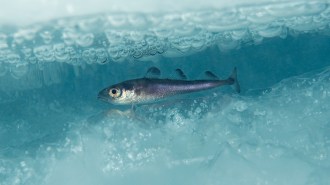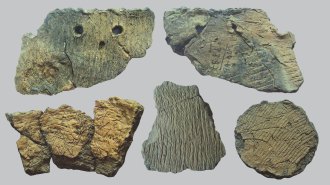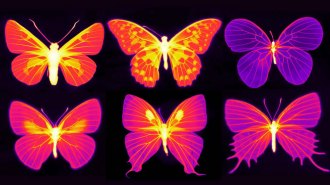All Stories
-
 Life
LifeWolves regurgitate blueberries for their pups to eat
The behavior, documented for the first time, suggests that fruit may be more important to wolves than previously thought.
By Jake Buehler -
 Space
SpaceAn ancient galaxy grew massive — then oddly stopped making stars
After ferociously producing stars for a few hundred million years, this galaxy in the early universe gave up, and astronomers aren’t sure why.
-
 Ecosystems
EcosystemsWill Australia’s forests bounce back after devastating fires?
Intense bushfires that have blazed down Australia’s eastern coast could have long-lasting effects on the continent’s unique plants and animals.
-
 Oceans
OceansNoise pollution from ships may scare Arctic cod from feeding grounds
Melting Arctic sea ice is opening up northern waters to increased shipping, and the vessel noise is taking a toll on Arctic cod.
-
 Archaeology
ArchaeologyFood residues offer a taste of pottery’s diverse origins in East Asia
Clay pots emerged in different places and for different reasons, starting at least 16,000 years ago, a study suggests.
By Bruce Bower -
 Life
LifeHow thin, delicate butterfly wings keep from overheating
Structures in butterfly wings help living tissues such as veins release more heat than the rest of the wing.
-
 Space
SpaceESA’s Solar Orbiter will be the first spacecraft to study the sun’s polar zones
ESA's Solar Orbiter is now on its way to the sun, beginning a nearly two-year journey.
-
 Life
LifeThe board game Oceans captures the beauty and ferocity of marine life
North Star Games' Oceans refines the gameplay of its predecessor, Evolution, and creates an immersive, nuanced game world.
By Mike Denison -

Readers were curious about a new depression drug and more
Readers had questions about ketamine, bourbon, a universal mystery and more.
-

When a new virus breaks
We’ve been covering the novel coronavirus outbreak from the beginning, with multiple reporters tracking down answers to questions readers may have and asking a lot of questions of our own.
By Nancy Shute -
 Health & Medicine
Health & MedicineCases of the new coronavirus hint at the disease’s severity, symptoms and spread
As the coronavirus outbreak continues, estimates suggest that the majority of cases are mild. New research is clarifying how more severe cases progress.
By Aimee Cunningham and Jonathan Lambert -
 Earth
EarthHere are 5 of the weirdest auroras, including the newly spotted ‘dunes’
A newfound type of aurora dubbed the “dunes” joins the ranks of black auroras, STEVE and other obscure auroral phenomena.